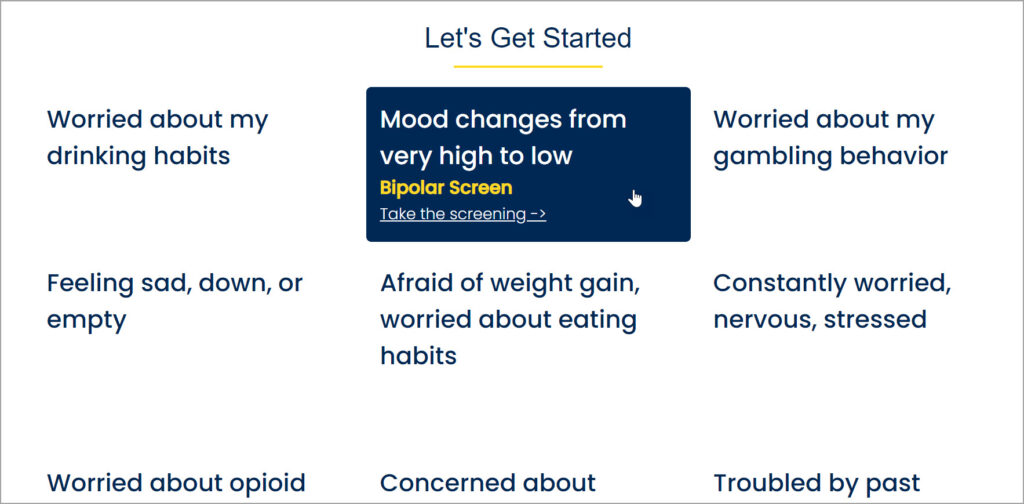| By Tara Blair, Graduate Student, Eastern Michigan University |
For many, the month of May evokes images of flowers, end-of-year celebrations at school, Mother’s Day cards, and other excessively cheerful concepts. I guess it’s a little ironic that May was also chosen for National Mental Health Awareness Month, an observation that has the potential to incite challenging, albeit vital, conversations about the state of mental health in America. This topic is especially relevant for college students stressing about their workload and preparing for final exams. This May, as college campuses gear up for the summer term, let’s also make sure to bring attention to the mental health resources available to the student body.
As a graduate student at Eastern Michigan University (EMU), I’ve struggled with the stress and anxiety common in this phase of life. Faced with impending examinations and thesis research—not to mention the pressure and competition involved in finding a job after graduating—there are times when I’ve felt lost and overwhelmed. I recognize that these feelings affect many of my peers, but the support systems available to graduate students are less obvious than those for incoming undergraduates. When you’re not living on campus and surrounded by safety nets, knowing where to turn for help can be more challenging.
Luckily, EMU has a lot, and I mean a lot, of resources for any student struggling with their mental health. So, in light of National Mental Health Awareness Month, I figured it was a poignant time to share my journey toward finding help on campus.
“When in Doubt, Go to the Library”
Famously, Hermione Granger from the Harry Potter series is moving the plot forward with her endless discoveries at the school library. I can’t necessarily compare the collection at the Bruce T. Halle Library to the reading stacks at Hogwarts Castle, but I’d argue that it might be close. The Halle Library’s automated book retrieval system is pretty magical.
As EMU’s only campus library, the Halle Library features space for so much more than books; however, there are nearly a million physical titles to discover. In addition to the free tutoring, IT support desk, theater, and cafe, our library subscribes to a massive network of online databases, offering students like me an endless amount of information to discover.
So, when I realized that I was struggling with my mental health, my first stop was the Halle Library. After all, it’s intimidating to approach a mental health professional for the first time, but it takes very little effort to enter a library. It’s a quiet, judgment-free zone where you can take your time and find the answers you need. For me, the first stop was Gale eBooks. This resource is an online collection for, well, everything.
Gale eBooks has a curated Mental Health Collection designed to accurately address mental-health-related questions and provide guidance. Because these titles are offered through a digital platform, I could access the information on my laptop or even my iPhone. It was important to me that I could begin to seek help privately. As a graduate student, I felt somewhat insecure about admitting my personal struggles. After all, one would think that after several years spent in higher education, I would have been able to navigate stress and anxiety management more effectively.
However, I quickly realized that my situation was not at all uncommon. In fact, a 2017 study from Nature demonstrated that at least a quarter of its survey respondents—all PhD-level researchers—experienced elevated stress and worry during their time as graduate students. Imagine—this was happening before the pandemic turned all our lives upside-down. I couldn’t help but feel some comfort that my peers likely felt the same way I did—we just weren’t talking about it.
“The Important Thing Is Generally ‘The Next Step’”
So said Theodore Roosevelt, and if it worked for him, then it was good enough advice for me. Once I realized that my mental health concerns were absolutely normal, I felt more confident reaching out for help. I wasn’t quite ready to talk out loud about the immense pressure and anxiety I was feeling, but EMU was one step ahead of me. The office for Counseling and Psychological Services (CAPS) hosts more than a dozen free behavioral health screenings for anyone to use—you don’t even have to be a student. These screenings are brief and simple, and they help determine whether or not there is a need to connect with an actual mental health provider. The whole program is anonymous and confidential too. Plus, once you’ve finished answering the questions, you’ll get results and additional resources.

I completed the screening for generalized anxiety. My days were too often spent worrying over absolutely everything. I was frequently tired and struggled to concentrate on my studies. The screening was maybe a dozen questions, taking me less than a minute to complete. My answers suggested that it was likely that I was struggling with generalized anxiety disorder and recommended I connect with a provider for a clinical evaluation. At the same time, the system offered some basic guidelines to help with my anxiety, including exercise, social support, and eating well.
“There Are Many Ways of Getting Strong, Sometimes Talking Is the Best Way”
I have learned to appreciate Andre Agassi’s words of wisdom and decided to take his advice. After completing the screening for generalized anxiety, I understood that I should talk to someone about how I was feeling, and the CAPS website helped walk me through that process. I couldn’t believe how easy EMU made it for students like me to find mental health support. I could e-mail them to make my appointment. All of the new client paperwork was available to complete online, and they could get me scheduled within a week. Plus, both part-time and full-time students can visit the mental health clinic for free.
While on the CAPS website, I registered for the next session of Feeling Better 101, a free workshop for any EMU student. I also took a moment to familiarize myself with the school’s emergency resources, including an after-hours crisis text line.
The main takeaway from my whole experience is this: mental health care should be accessible. Despite the increased prevalence of mental health-related concerns on U.S. campuses, individuals suffering from these issues still fight stigma and feel shame. The EMU staff made seeking mental health support effortless and private. From accessing the reliable, easy-to-navigate resources from the Halle Library to schedule an appointment with a licensed therapist, everything was at my fingertips.
National Mental Health Awareness Month matters. It should feel okay to speak out loud about mental health, and I’m using this platform to let other university students know that there is help out there. I recognize that mental health resources aren’t always this easy to navigate, but many institutions of higher education, especially their libraries and counseling services, make it incredibly easy to get the information and services you need. This May, take the next step on your own mental health journey or maybe help a loved one find support.
If you or someone you care about is facing an emergency mental health crisis, call the National Suicide Prevention Lifeline by dialing 988.
Meet the Author
Tara Blair is an Integrated Marketing and Communications graduate student at EMU who enjoys college life and walking her dogs in between school work. Although she reads school articles all day, she still enjoys settling down with a nice book at the end of the day.


